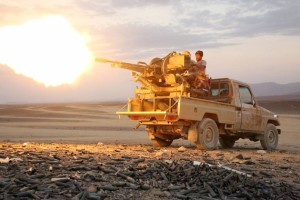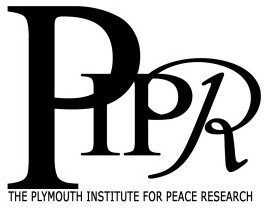The Shame of Killing Innocent People
By Kathy Kelly
27 April, 2017

The Popular Resistance Committee supports Saudi-backed President Hadi. PRC fighter fires a vehicle-mounted gun in Sirwa.
On April 26th, 2017, in Yemen’s port city of Hodeidah, the Saudi-led coalition which has been waging war in Yemen for the past two years dropped leaflets informing Hodeidah’s residents of an impending attack. One leaflet read: “Our forces of legitimacy are heading to liberate Hodeidah and end the suffering of our gracious Yemeni people. Join your legitimate government in favor of the free and happy Yemen.” And another: “The control of the Hodeidah port by the terrorist Houthi militia will increase famine and hinder the delivery of international relief aid to our gracious Yemeni people.”
Certainly the leaflets represent one aspect of a confusing and highly complicated set of battles raging in Yemen. Given alarming reports about near famine conditions in Yemen, it seems the only ethical “side” for outsiders to choose would be that of children and families afflicted by hunger and disease.
Yet the U.S. has decidedly taken the side of the Saudi-led coalition. Consider a Reuters report, on April 19, 2017, after U.S. Defense Secretary James Mattis met with senior Saudi officials. According to the report, U.S. officials said “U.S. support for the Saudi-led coalition was discussed including what more assistance the United States could provide, including potential intelligence support…” The Reuters report notes that Mattis believes “Iran’s destabilizing influence in the Middle East would have to be overcome to end the conflict in Yemen, as the United States weighs increasing support to the Saudi-led coalition fighting there.”
Iran may be providing some weapons to the Houthi rebels, but it’s important to clarify what support the U.S. has given to the Saudi-led coalition. As of March 21, 2016, Human Rights Watch reported the following weapon sales, in 2015 to the Saudi government: July 2015, the US Defense Department approved a number of weapons sales to Saudi Arabia, including a US $5.4 billion deal for 600 Patriot Missiles and a $500 million deal for more than a million rounds of ammunition, hand grenades, and other items, for the Saudi army.
According to the US Congressional review, between May and September, the US sold $7.8 billion worth of weapons to the Saudis.
In October, the US government approved the sale to Saudi Arabia of up to four Lockheed Littoral Combat Ships for $11.25 billion.
In November, the US signed an arms deal with Saudi Arabia worth $1.29 billion for more than 10,000 advanced air-to-surface munitions including laser-guided bombs, “bunker buster” bombs, and MK84 general purpose bombs; the Saudis have used all three in Yemen.
Reporting about the role of the United Kingdom in selling weapons to the Saudis, Peace News notes that “Since the bombing began in March 2015, the UK has licensed over £3.3bn worth of arms to the regime, including:
£2.2 bn worth of ML10 licences (aircraft, helicopters, drones)
£1.1 bn worth of ML4 licences (grenades, bombs, missiles, countermeasures)
£430,000 worth of ML6 licences (armoured vehicles, tanks)
What has the Saudi-led coalition done with all of this weaponry? A United Nations High Commissioner for Human Rights panel of experts found that:
“At least 3,200 civilians have been killed and 5,700 wounded since coalition military operations began, 60 percent of them in coalition airstrikes.”
A Human Rights Watch report, referring to the UN panel’s findings, notes that the panel documented attacks on camps for internally displaced persons and refugees; civilian gatherings, including weddings; civilian vehicles, including buses; civilian residential areas; medical facilities; schools; mosques; markets, factories and food storage warehouses; and other essential civilian infrastructure, such as the airport in Sana’a, the port in Hodeidah and domestic transit routes.”
Five cranes in Hodeidah which were formerly used to offload goods from ships arriving in the port city were destroyed by Saudi airstrikes. 70% of Yemen’s food comes through the port city. Saudi coalition airstrikes have hit at least four hospitals supported by Doctors Without Borders.
In light of these findings, the leaflets fluttering down from Saudi jets on the beleaguered city of Hodeidah, encouraging residents to side with the Saudis “in favor of the free and happy Yemen” seem exceptionally bizarre.
UN agencies have clamored for humanitarian relief. Yet the role the UN Security Council has played in calling for negotiations seems entirely lopsided. On April 14, 2016, UN Security Council Resolution 2216 demanded “that all parties in the embattled country, in particular the Houthis, immediately and unconditionally end violence and refrain from further unilateral actions that threatened the political transition.” At no point is Saudi Arabia mentioned in the Resolution.
Speaking on December 19, 2016, Sheila Carpico, Professor of Political Science at the University of Richmond and a leading Yemen specialist called the UN Security Council sponsored negotiations a cruel joke.
These negotiations are based on UN Security Council resolutions 2201 and 2216. Resolution 2216 of 14 April 2015, reads as if Saudi Arabia is an impartial arbitrator rather than a party to an escalating conflict, and as if the GCC “transition plan” offers a “peaceful, inclusive, orderly and Yemeni-led political transition process that meets the legitimate demands and aspirations of the Yemeni people, including women.”
Although scarcely three weeks into the Saudi-led intervention the UN’s deputy secretary-general for human rights said that the majority of the 600 people already killed were civilian victims of Saudi and Coalition airstrikes, UNSC 2216 called only on “Yemeni parties” to end the use of violence. There was no mention of the Saudi-led intervention. There was similarly no call for a humanitarian pause or corridor.
The UN Security Council resolution seems as bizarre as the leaflets delivered by the Saudi jets. The U.S. Congress could put an end to U.S. complicity in the crimes against humanity being committed by military forces in Yemen. Congress could insist that the U.S. stop supplying the Saudi led coalition with weapons, stop helping Saudi jets to refuel, end diplomatic cover for Saudi Arabia, and stop providing the Saudis with intelligence support. And perhaps the U.S. Congress would move in this direction if elected representatives believed that their constituents care deeply about these issues. In today’s political climate, public pressure has become vital.
Historian Howard Zinn famously said, in 1993, “There is no flag large enough to cover the shame of killing innocent people for a purpose which is unattainable. If the purpose is to stop terrorism, even the supporters of the bombing say it won’t work; if the purpose is to gain respect for the United States, the result is the opposite…” And if the purpose is to raise the profits of major military contractors and weapon peddlers?
Kathy Kelly ([email protected]) co-coordinates Voices for Creative Nonviolence (www.vcnv.org)

